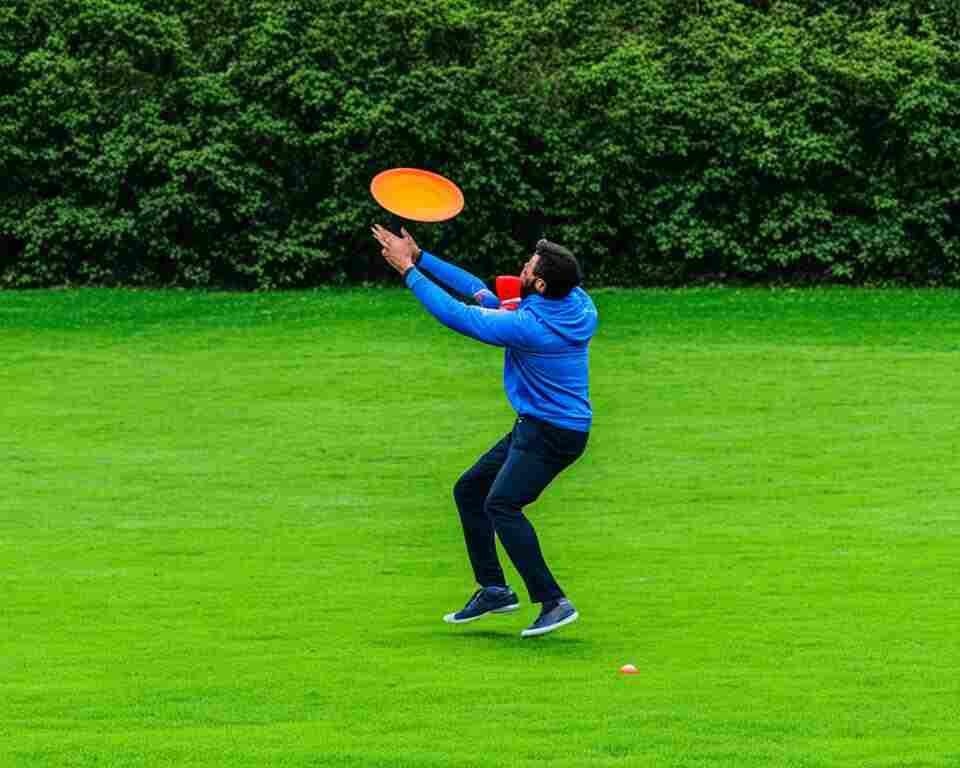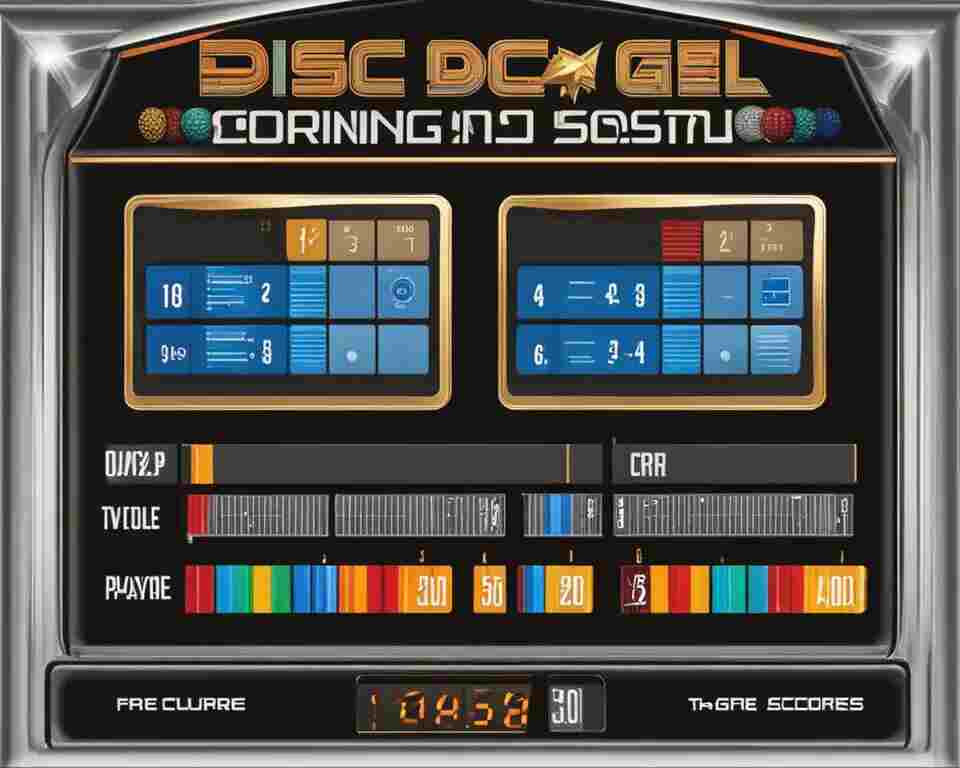Disc golf scoring can sometimes be perplexing, especially when it comes to negative scores. In this article, I will guide you through the intricacies of understanding negative scores in disc golf and how they can impact gameplay.
We will dive into the scoring system used in disc golf and explore the significance of negative numbers on your scorecard. I’ll also discuss how disc golf scores can be compared in both personal and competitive contexts, giving you a well-rounded understanding of this unique sport.
Key Takeaways:
- Disc golf scores can go beyond traditional positive numbers and may include negative scores.
- Negative scores in disc golf indicate that you completed the course in fewer throws than the par score for each hole.
- Understanding negative scores helps players evaluate their performance and track improvement over time.
- Negative scores can have different meanings based on context, such as in personal play or in a competitive setting.
- By analyzing negative scores, players can identify areas for improvement and develop effective strategies to enhance their disc golf game.

Decoding Disc Golf Scores: Impact on Gameplay
In disc golf, understanding how scores are calculated and the impact they have on gameplay is crucial for players looking to improve their performance. This section will provide a comprehensive overview of the disc golf scoring system, the significance of negative numbers on your scorecard, and strategies for comparing scores and enhancing your disc golf abilities.
How the Scoring System Works in Disc Golf
The scoring system in disc golf is based on the number of throws it takes a player to complete each hole. Each throw is counted, with the goal of completing the hole in as few throws as possible. The player’s score is the total number of throws taken to complete all the holes in a round. Lower scores indicate better performance, while higher scores reflect a greater number of throws.
The significance of negative numbers on a disc golf scorecard is that they indicate a score below par. In disc golf, par represents the number of throws a skilled player should require to complete a specific hole. A negative score means the player completed the hole in fewer throws than par, indicating a high level of skill and performance.
Comparing Disc Golf Scores: Personal and Competitive Context
Comparing disc golf scores can be done in various contexts, both personal and competitive. On a personal level, comparing scores can help players track their progress over time and set goals for improvement. It allows individuals to gauge their performance and identify areas where they need to focus on enhancing their skills.
In a competitive context, comparing scores becomes even more significant. Tournaments and competitions typically have leaderboards and rankings where players’ scores are compared. This allows players to see how they stack up against their peers and provides motivation for striving to achieve better scores.
Scorekeeping Strategies to Improve Disc Golf Performance
Improving disc golf performance requires not only skill but also effective scorekeeping strategies. Here are some tips to help you keep track of your scores and enhance your gameplay:
- Consistent Record-Keeping: Maintain a record of your scores after each round to track your progress and identify trends in your performance.
- Goal Setting: Set specific goals for improving your scores, such as reducing the number of throws on certain holes or achieving an overall lower score.
- Course Management: Strategically plan your throws to minimize risks and avoid penalties, helping you achieve lower scores.
- Practice and Training: Regularly practice your throws and work on different aspects of your game to improve your skills and, ultimately, your scores.
- Mental Focus: Stay mentally focused during rounds, minimizing distractions and maintaining a positive mindset to optimize your performance.

Are Negative Scores in Disc Golf Bad?
In the world of disc golf, negative scores can be a topic of debate and interpretation. Some may view negative scores as a cause for concern, while others may see them as a reason for celebration. Understanding the implications of negative scores requires a closer look at different perspectives and considerations.
Interpreting Negative Scores: Cause for Concern or Celebration?
Negative scores in disc golf can be interpreted in various ways. On one hand, a negative score may indicate that a player has performed below par or their expected performance level. This can be seen as a cause for concern if the player is striving to improve their game and achieve better overall scores.
On the other hand, negative scores can also be viewed as a reason for celebration. In certain formats or tournaments, a negative score may signify exceptional play and skill. It demonstrates that the player has completed the course in fewer throws than the designated par and has surpassed expectations.
Analyzing Disc Golf Rankings and Leaderboards
When it comes to competitive play, negative scores play a significant role in disc golf rankings and leaderboards. In tournaments and leagues, players’ scores are assessed and compared to determine their placement and standing among other participants. Negative scores can propel players to the top of the leaderboard, highlighting their exceptional performance and skill.
By analyzing disc golf rankings and leaderboards, players and enthusiasts can gain insights into the significance of negative scores. It allows them to understand how a negative score can impact their overall standing and competitiveness in the sport.
Understanding Disc Golf Scorecards and Scoring Guidelines
To make sense of negative scores in disc golf, it is essential to grasp the intricacies of scorecards and scoring guidelines. Disc golf scorecards are used to keep track of players’ performance throughout a round or tournament. They provide a clear record of the number of throws taken on each hole, along with the total score.
Scoring guidelines outline the par for each hole and determine what constitutes a negative score. These guidelines enable players to understand how their performance compares to the designated standard and how negative scores can positively or negatively impact their overall scores.
Cultivating Effective Disc Golf Strategies
To navigate disc golf successfully, players must cultivate effective strategies. Strategies can help players minimize errors and optimize their throwing techniques, ultimately leading to better scores.
Some effective disc golf strategies include:
- Practicing different throwing techniques to adapt to different course layouts and conditions
- Working on accuracy and consistency in throwing to minimize unnecessary strokes
- Developing a solid putting game to improve scores on shorter holes
- Studying course maps and understanding hole layouts to plan shots strategically
- Continuously honing skills through regular practice and seeking guidance from experienced players

| Pros of Negative Scores | Cons of Negative Scores |
|---|---|
| Recognition of exceptional performance | Indication of below-par performance |
| Higher placement in rankings | Potential to be demotivating |
| Opportunity to challenge personal bests | Possibility of feeling pressure to consistently achieve negative scores |
Conclusion
In conclusion, understanding negative scores in disc golf is vital for grasping the intricacies of this exciting sport. Negative scores can have both positive and negative implications, depending on the context and individual perspective.
By decoding disc golf scores and gaining insights into the scoring system, you can make more informed decisions and develop effective strategies to enhance your gameplay. Understanding the significance of negative numbers on your scorecard allows you to evaluate your performance accurately and identify areas for improvement.
Whether you find yourself celebrating or reflecting on negative scores, remember that the ultimate goal is to continue growing as a disc golfer and enjoying the game to its fullest. Embrace the challenges presented by negative scores as learning opportunities, and use them as motivation to strive for better results in future rounds.


